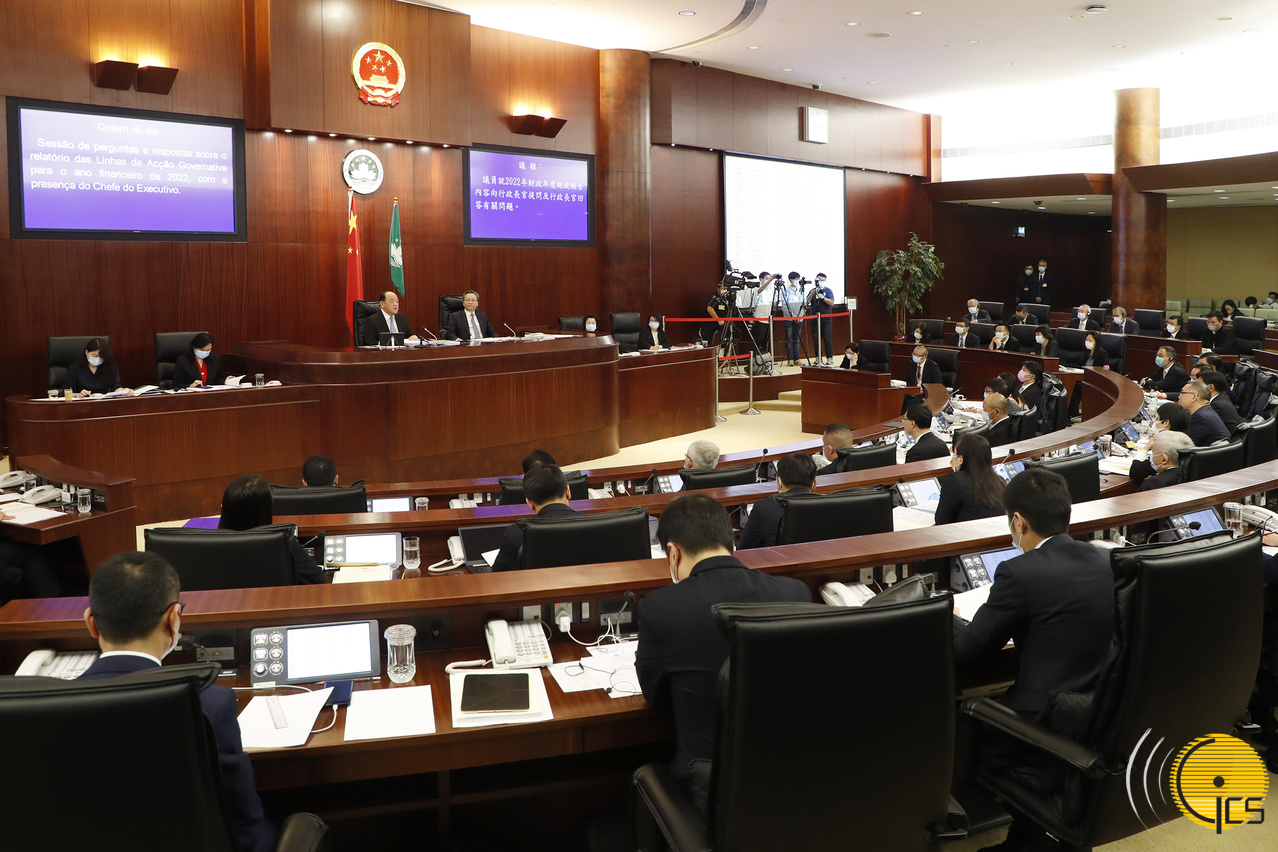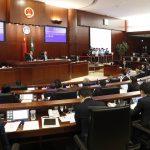 The Chief Executive, Mr Ho Iat Seng, attends a plenary session of the Legislative Assembly to answer questions raised by Legislative Assembly members concerning the Policy Address for the Fiscal Year 2022.
The Chief Executive, Mr Ho Iat Seng, attends a plenary session of the Legislative Assembly to answer questions raised by Legislative Assembly members concerning the Policy Address for the Fiscal Year 2022.
The Chief Executive, Mr Ho Iat Seng, assured legislators that the Government would do its utmost regarding the development of the Islands District Medical Complex, advancement of Macao as a smart city, and introduction of new flood prevention facilities, in a bid to improve the overall wellbeing of Macao residents.
Mr Ho made the remarks on Wednesday (17 November) during a question-and answer session at the Legislative Assembly regarding the Policy Address for the Fiscal Year 2022.
He pointed out that the Islands District Medical Complex would have enough capacity to serve not only Macao’s population, but additional people. He explained that the new medical facility aimed to promote the development of medical tourism and the “big health” industry in Macao, and to offer an alternative to local patients who would otherwise need to seek medical treatment outside the city.
The Chief Executive added that the Islands District Medical Complex would offer government-subsidised services to Macao residents, although it would be under the branding of the Peking Union Medical College Hospital (PUMCH).
According to Mr Ho, the new hospital would be equipped with first-class facilities and staffed by outstanding doctors and other medical workers. Therefore, he was confident that it would be able to help serve the medical needs of the Guangdong-Hong Kong-Macao Greater Bay Area’s population of 70 million people.
The Government would select local doctors and medical graduates for internships at PUMCH in Beijing before appointing them to work at the Islands District Medical Complex, noted the Chief Executive.
With regard to the development of Macao as a smart city, Mr Ho said the Government had already built a cloud computing platform with about 440 data sets that were accessible to the public.
The coverage of e-government services would be continually expanded with the introduction of the new version of “My One-stop Public Services Account”, he added.
The Chief Executive said the Government had already completed trials of a smart-bus control system and a mobile phone application for real-time commuting information. In the future, the Government would continue to enhance smart transport planning, particularly in New Urban Zone Area A.
However, Mr Ho pointed out that the development of smart transport in a densely-populated city like Macao was bound to encounter difficulties.
He said the Government had commissioned a research institution in Chongqing – a city on mountainous terrain that famously solved its traffic problems via innovative methods – to conduct a 10-year planning study to help Macao tackle its transport challenges.
On the issue of flood control and prevention, the Chief Executive said the pumping facilities at the Inner Harbour area had been effective in mitigating flooding in some ‘black spots’ during this year’s typhoon season. The Government would therefore build some more pumping stations in the area, as a short-term answer to the flooding issue.
He explained that other long-term measures to tackle flooding, such as the construction of tidal gates, would need further meticulous research and planning.
The preliminary work for the construction of tidal gates was ongoing but it would need approval from the Central Government before it could go ahead, noted Mr Ho.
He also revealed that the construction and maintenance of tidal gates would be very costly. The mere design of this type of project would carry a price tag of hundreds of millions of patacas, said the Chief Executive.
Regarding urban planning, Mr Ho said the Macao Urban Master Plan would be introduced by the end of this year, and follow-up work would proceed accordingly. He stressed that the master plan could not be delayed any longer since many future zoning plans were dependent on this document.
Only when zoning plans were in place could the Government proceed with land auctions for private projects as proposed in the Policy Address, said Mr Ho.
In Wednesday afternoon’s Legislative Assembly session, the Chief Executive answered questions from a total of 31 lawmakers. Other topics discussed included: the Guangdong-Macao Intensive Cooperation Zone in Hengqin; the Greater Bay Area; urban renewal; labour legislation; pandemic prevention measures; housing policy; welfare of the elderly; healthcare; economic recovery; tourism development; sport and culture development; cultivation of young talent; the civil service; government transparency; technology development; professional accreditation; and education.


